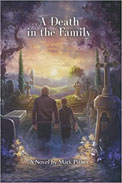
 |
Pifher, a retired lawyer and world traveler living in Colorado, effectively depicts the story of Tom O’Brien, a journalist who has lost his wife to cancer. The author uses the literary device of a shared narrative penned by a daughter, Katherine (or Katie), who is twenty-one, and her dying father, who is fifty-seven. Hardly a cheerful book, strained family relations emerge as well as a chain of deaths, a murder conviction, the realization of a sure death in prison, unemployment, cerebral palsy, a fifteen-year-old losing her mother, and other tragic events, such as sexual harassment and assault in a congressional office and exposure of hidden secrets and vulnerabilities.
Yet resiliency, light, and hope surface. The details of locales are covered. With these, the edge of desperation is maintained as many characters try to grope through dark worlds. They share in mundane dinners, drives, ham and cheeses on rye, turkeys on sourdough, and plain sea salt chips, making arguments and counterarguments as they pursue angles and leads on life. Death is constantly there, along with realizations that “hope is a malleable emotion.”
The author skillfully depicts the irony of deferred dreams, such as those of a twenty-five-year-old brother who lives in Los Angeles, works part-time for a cleaning service, and teaches while wanting to compose jazz. Pifher gives careful, measured thought in portraying emotional states like cynicism and naivete as part of people’s characters. These are embodied in the clothes they wear, how they interact, the number of their visits to psychiatrists, their approach to melodies and books, their practiced phrases, how they remember their childhoods, where they live in the present, the activities in which they engage, and how they walk. Readers in search of wandering in pursuit of depth rather than a fast-paced plot will enjoy this book.